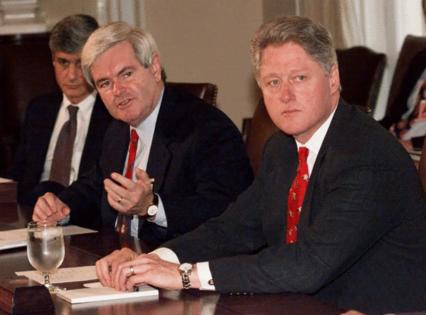Clive Crook: The third way is the right way for Democrats
Published in Op Eds
What’s most remarkable about the economic policies of Donald Trump’s second term is the absence of effective opposition. The president’s ambitions are radical and enormously consequential — nothing less than to wreck the global trading system, expand executive power far beyond prevailing norms and explode public borrowing. Four months in, this agenda is well advanced.
Where’s the resistance? The courts are testing Trump’s expansive claims to executive power, including its application to trade policy, but Congress might as well not exist.
Until recently the party that commands majorities in both chambers advocated limited government, liberal trade and at least the pretense of fiscal discipline. In thrall to their new champion, Republicans have reversed themselves on every point.
One also wonders, where are the Democrats?
It turns out that, as Trump goes about his business, they’re preoccupied with a bitter internal debate over pursuing “abundance” — meaning the case for easing permitting rules and other regulations to let big investment projects move forward faster — or a more populist program that pits workers against the wealthy.
As a proud neoliberal, I salute the revelation that abundance is better than scarcity and that unduly burdensome regulations can do more harm than good. Still, what a strange, narrow quarrel for the party to be having in 2025.
For the next four years, the U.S. lacks a government advocating the kind of investment in infrastructure and clean energy that Democrats favor. (The White House might be interested in making it easier to open new coal mines in national parks, but that’s the wrong kind of abundance.) So why aren’t Democrats pushing back on what’s most urgent?
The answer is depressingly simple. They’ve torn up the tried-and-tested blueprint for opposing Trump-style economic populism — namely, the New Democrat center-leftism advocated by Bill Clinton in the 1990s and (for campaign purposes, at any rate) by Barack Obama in 2008.
Much of the party derides every part of that so-called neoliberal agenda, with particular scorn for its positions on trade, deregulation and fiscal restraint. And almost everybody in the party believes (or is expected to say) “There’s no going back.” It’s a sign of how far the current Democratic Party has to travel that “abundance” — a cautiously framed fragment of Clintonian realism about the way the world works, and perhaps its most obvious and politically appealing fragment — faces such blowback.
Of course, I’m hoping Democrats who fear that this effort will take the party backward are correct. Maybe “abundance” is indeed the thin end of a wedge. Start with YIMBY, and before you know it, Democrats will again be making the case for trade as an enabler of growth, and for fiscal discipline as an essential component of good government. Dare I imagine that the Washington Consensus, albeit with suitable rebranding (sure, call it the “Abundance Agenda?”) will one day be back in business?
Too few Democrats are even willing to consider this opportunity, such is their commitment to post-neoliberalism. Myths about the ideology they despise and how it failed are foundational for the progressives who energize the party and its electoral efforts. The party will have to ditch these ideas, and marginalize the people who hold them, if it wants to lead an effective good-government opposition to Trumpism. Democrats are still far from ready to have that bigger fight.
The progressives’ most preposterous fallacy is that Clinton-style neoliberalism ever amounted to “market fundamentalism.” For a start, in the long tradition of liberal thought, it was above all pragmatic and thus definitionally anti-fundamentalist.
Competitive markets are good at some things (allocating most resources) and bad at others (supplying public goods, delivering economic security, distributing incomes equitably). As needless as it should be to say, neoliberals never denied that you can have too little government as well as too much — and they rightly insisted on the pervasiveness of trade-offs that many politicians, regardless of ideology, prefer to ignore. This thinking readily supports an intelligent center-left platform.
Yet neoliberalism failed, didn’t it? Free trade hollowed out the U.S. economy, financial deregulation led to the Great Recession of 2008 and fiscal austerity needlessly delayed the subsequent recovery — resulting, by the way, in Trump.
None of these claims is straightforwardly false, but all of them are incomplete and misleading. As I’ve argued before, the depredations of trade on middle-class Americans are grossly exaggerated. Living standards today are higher than they would have been if not for NAFTA and China’s sudden participation in the global economy.
The causes of the crash were complicated; flawed deregulation contributed, but to infer that deregulation is always bad is absurd. Fiscal policy was too tight after the crash, but that doesn’t mean that deficits can never be too big. In all these cases, balances need to be struck. That’s the neoliberal way.
What can one reasonably demand of government? Today’s contending fundamentalisms offer, on one side, a repudiation of markets and greed and, on the other, an assault on foreigners and elites. Just how dangerous and dumbed down can politics get? Give me Third Way centrism any day.
_____
This column reflects the personal views of the author and does not necessarily reflect the opinion of the editorial board or Bloomberg LP and its owners.
Clive Crook is a Bloomberg Opinion columnist and member of the editorial board covering economics. Previously, he was deputy editor of the Economist and chief Washington commentator for the Financial Times.
©2025 Bloomberg L.P. Visit bloomberg.com/opinion. Distributed by Tribune Content Agency, LLC.

























































Comments